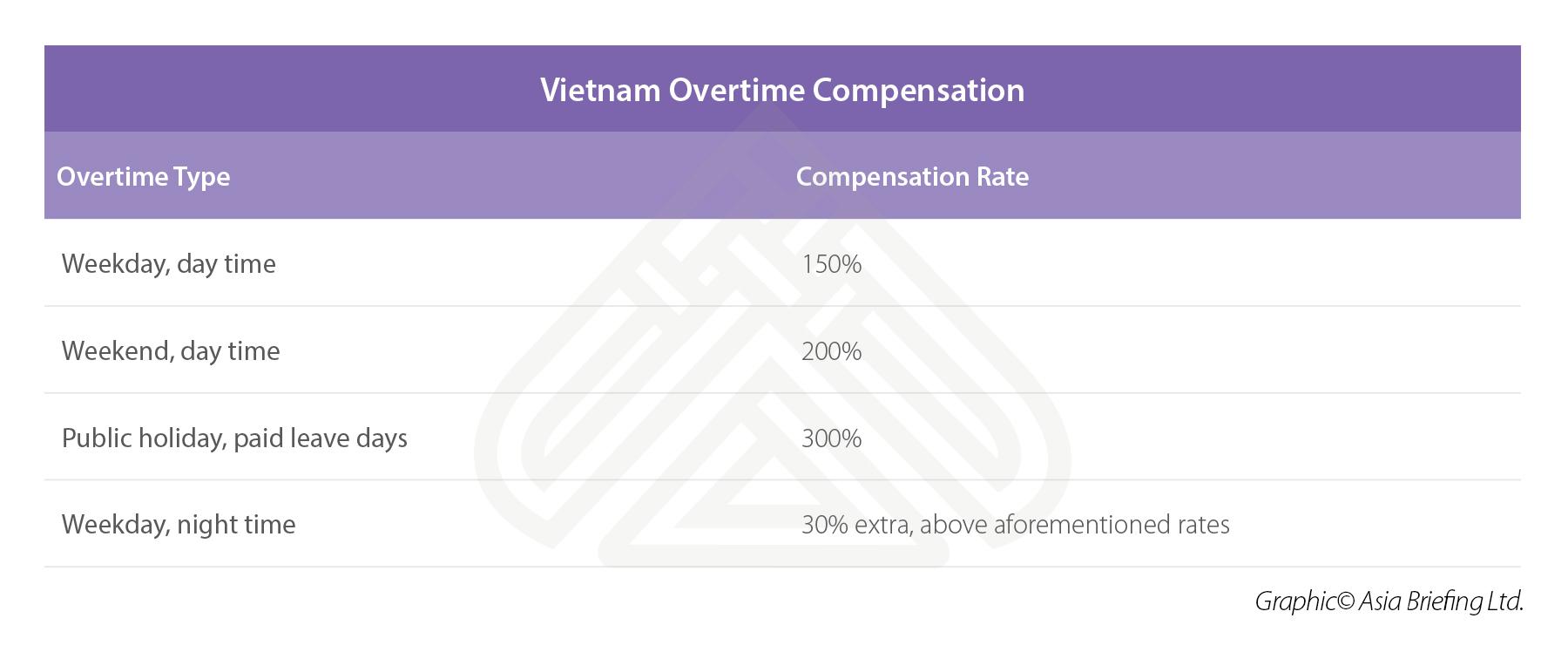Vietnam’s business environment, free trade costs, and its ideal location as a China plus one destination make it favorable among foreign investors looking to relocate or diversify their operations.
However, as Vietnam’s economy continues to grow, increasing wages will be an unavoidable feature of doing business in the country and is increasingly important for companies to understand how to navigate.
Vietnam increased the minimum wage by 6 percent starting in July 2024. This adjustment represents a compromise between the 6.48 to 7.3 percent requested by the Vietnam General Confederation of Labor and the 4.5 to 5 percent suggested by the Vietnam Chamber of Commerce and Industry. The hike came after a two-year hiatus in minimum wage adjustments despite rising inflation rates, which may necessitate further increases shortly.
What are the minimum wage rates in Vietnam?
There are two kinds of minimum wages in Vietnam.
The first type is the common minimum wage of VND 2,340,000 (US$93) which is used to calculate salaries for employees in state-owned organizations and enterprises, as well as to calculate the social contribution for all enterprises (i.e., the maximum social contribution is 20 times the common minimum wage).
The second type of minimum wage is the Regional Minimum Wage used for employees in all non-state enterprises based on zones as defined by the government.
Current (2022)
Change (6%)
New (2024)
Region
VND
US$
VND
US$
VND
US$
1
4,680,000
192.33
280,800
11.54
4,960,000
196
2
4,160,000
170.96
249,600
10.26
4,410,000
175
3
3,640,000
149.59
218,400
8.98
3,860,000
153
4
3,250,000
133.56
195,000
8.01
3,450,000
137
In addition, the labor code also ensures minimum hourly wage rates for the relevant regions. These are:
- Region I - VND 23,800 (US$0.94)
- Region II - VND 21,200 (US$0.84)
- Region III - VND 18,600 (US$0.74)
- Region IV - VND 16,600 (US$0.66)
Wages for employees who are paid daily or on a weekly basis must not be lower than the minimum wage when converted to monthly or hourly rates.
Who is eligible?
The wage increase applies to employees who work under labor contracts under the labor code, including businesses, organizations, cooperatives, households, and individuals who hire employees on labor contracts.
How are minimum wage rates applied?
All contracts must use the minimum wage rates as the lowest amount of compensation for any commercial arrangement between an employer and an employee. Companies should ensure that the correct wage rate is applied, especially in certain special circumstances, including:
- If the company has any branches or affiliate companies in a different subregion, the region-based minimum wage will be applied to all employees of those offices.
- For companies located in an industrial park or the export processing zone that spans two or more, the highest minimum wage rate will apply.
Salary components
In general, an employee’s typical monthly salary package includes their gross salary and mandatory insurance contributions. Personal income taxes (PIT) will be levied on the balance after mandatory insurance contributions have been deducted.
In some cases, the gross salary may also include overtime pay, allowances, and bonuses, as well as additional benefits.
Further, Vietnamese employees must receive compensation in Vietnamese Dong, even if they work for foreign companies. Foreign employers can only base salary rates in either Vietnamese Dong or foreign currencies for foreign employees, but salaries that are based in foreign currencies must be converted into Vietnamese Dong for compulsory social insurance, personal income tax, and trade union pay. The exchange rate is based on the Vietnamese governments' foreign exchange.
Are employees eligible for overtime pay in Vietnam?
Employee consent must be obtained if the employer plans overtime work regarding the terms, locations, and overtime work. Employees who work extra hours are also paid for those extra hours based on their current hourly wages, as outlined above.
In cases where an employee works overtime hours at night, they are paid extra according to the applicable regulations. Further, employees who are given time off in compensation for working extra hours should be paid the difference between their wages during normal working hours and overtime work. Finally, employees who work night shifts should be paid at least 30 percent higher than normal.
In general, an employee’s typical monthly salary package includes their gross salary and mandatory insurance contributions. Personal income taxes (PIT) will be levied on the balance after mandatory insurance contributions have been deducted.
Overtime compensation
If a company triggers overtime, they will be obligated to compensate employees beyond the wages that are outlined in their contract. This is applicable to all employees regardless of the wages that are offered. The following are the percentages in excess of the standard that are to be applied in the event that certain work-related thresholds are crossed.

There are limitations on the number of overtime hours an employee is allowed to work. As per the labor code, overtime hours cannot exceed 40 hours per month. The code also supplements cases where employers are permitted to organize overtime work for up to 300 hours per year; these include manufacturing and exporting electrical and electronic products as well as work requiring high technical qualifications.
If the employer and employee agree on an overtime deal, employers are permitted to assign their employees to work overtime for over 200 hours but not exceeding 300 hours per year, except in the following cases:
- Employees aged between 15 and under 18;
- Employees having mild disabilities with work capacity reduction of at least 51% or employees with severe disabilities or extremely severe disabilities;
- Employees doing arduous, hazardous, dangerous or extremely arduous, hazardous or dangerous work;
- Female employees in their 7th month of pregnancy onward (or the 6th month of pregnancy onward in case they work in the highlands, remote areas, bordering areas, or islands);
- Female employees nursing children aged under 12 months.

In cases where an employee works extra hours at night, they are paid extra in accordance with the applicable regulations. Further, employees who are given time off in compensation for working extra hours will need to be paid the difference between their wages during normal working hours and overtime work. Finally, employees who work night shifts should be paid at least 30 percent higher than normal.
There are special situations which may trigger other regulations within the code for overtime:
- Pregnant women: Women who are in their 7th month of pregnancy and women with babies under 12 months are not allowed to work overtime, work at night, or take long-distance business trips. Pregnant women who are performing heavy work must either be transferred to lighter work or decrease daily work time by an hour while maintaining the same total pay.
- Minor employees:
- Workers under the age of 18: Prohibited from working in dangerous conditions or with potential exposure to toxic substances. The Ministry of Labor, Invalids and Social Affairs (MoLISA) also establishes a limit on which industries and what kind of work minors can undertake.
- Minor employees between the ages of 15 and 18: May work a maximum of eight hours a day and 40 hours a week. They are only permitted to do overtime and night work in certain industries, as specified by the Ministry.
- Workers under the age of 15: Regulations establish a maximum of four hours a day and 20 a week, with no overtime or night work permitted. Working hours for those under 13 years of age are further reduced to one hour per day.
Performance and earnings-based bonuses for employees
Bonuses are given to employees based on company earnings and performance and as a way of boosting company morale and productivity. There are various kinds of bonuses that a company may grant its employees throughout the year.
All salaries and bonuses are subject to PIT in Vietnam.
13th-month salary
A 13th month’s salary is usually given as an “annual bonus” by both local and foreign companies in Vietnam to employees who have worked with the company for at least one year. Employees who have worked at a company for less than one year are typically given a bonus that is prorated and based on their actual employment period.
Lunar New Year or Tet bonus
A special bonus called the “Lunar New Year” bonus (or “Tet Bonus”) is often paid to employees prior to their leaving for the Lunar New Year holiday.
The amount of any Tet Bonus will be dependent on both company and employee performance but typically ranges from smaller amounts of money (up to an entire month’s salary) to larger amounts of money (up to an entire year’s salary) depending on the company's progress and goals.
Additional bonuses
Employees may also be given smaller bonuses for public holidays or other special days (e.g., International Labor Day or National Day). Senior management and other valued employees may be given bonuses during these days as well, including in the form of share certificates with a vesting period, for which the corresponding stock can be sold only after the employee has worked for the company for a certain amount of time.
Allowances and benefits
An employee may be entitled to several kinds of allowances and monetary or non-monetary benefits designed to retain staff. Some of these benefits are non-taxable, including:
- Payments for housing rent, power, water, and associated services for employees that amount to more than 15 percent of their total taxable income;
- Life insurance and optional insurance;
- Payment for a membership card, which does not include the user's name, of golf clubs, tennis courts, and other exclusive clubs;
- Payment for a membership card, which does not include the user's name, of health care, entertainment, etc. services;
- Telephone allowance;
- Stationery allowance;
- Uniform allowance in kind or in cash not exceeding 5 million VND;
- Lunch allowance not exceeding 730,000 VND;
- Funeral payment not exceeding any month's actual salary in the year;
- Wedding payment not exceeding any month's actual salary in the year;
- Transportation allowances;
- Training allowances;
- Employer support for fatal disease or illness;
- Round-trip flight ticket to return home country once a year for foreign employees or Vietnamese employees working abroad;
- Tuition fees for children of foreign workers working in Vietnam study in Vietnam, children of Vietnamese workers working abroad study overseas from kindergarten to high school;
- Personal incomes received from any associations and organizations if the employees receiving the grant are members of these associations and organizations and these associations and organizations’ funding is used from the State budget or managed according to the State's regulations;
- Payments paid by the employer for the deployment, rotating foreign workers to work in Vietnam according to regulations in the labor contract, and complying with the standard labor schedule according to the international practices of some industries such as oil and gas and mining.
Prefixed lump sum amounts (or “khoan chi” amounts) for telephone calls and services, stationery, uniforms, and per diem allowances are not subject to taxes if the amounts are within the levels set out under the relevant regulations.
Foreigners who work in Vietnam are also exempted from PIT on various benefits such as relocation allowances for moving into the country, airfare to their home country, and education fees for their children.



